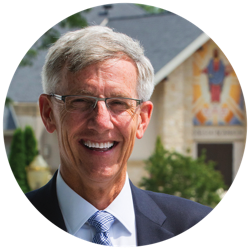You are considering a particular school for your higher education experience. You notice its history and something about charisms.
In your journey seeking to find the “right school,” you are discovering that Catholic colleges and universities are founded in one of three ways: by the Church, by the laity, or by a religious (or sponsoring) group. In the United States, the only institution founded by the Church is the Catholic University of America. There are a handful of schools that have been founded and are operated by lay leaders, such as Christendom and Wyoming Catholic College. Most of the 220+ Catholic colleges and universities in this country were founded by a religious order, such as the Augustinians, Benedictines, Carmelites, Christian Brothers, Dominicans, Franciscans, Jesuits, Marianists, Norbertines, the Religious of the Sacred Heart of Mary, Sisters of Mercy, or the Sisters of Providence to name only a few.
While all of them are aligned with the Roman Catholic Church, they also bring to their ministry of education a unique and distinctive approach. You will often see or hear this adaptation discussed in terms of a charism.
What does that mean?
One characteristic of the Catholic Christian experience is the presence and gifts of the Holy Spirit. An historical understanding of this reality stretches back over 2,000 years to the beginnings of the Church and is first mentioned by the Apostle Paul in his Letter to the Corinthians.
The term charism comes to us from the Greek word, charis, which means grace or free gift. Over time, men and women responding in a particular way to the gifts offered by the Holy Spirit organized as religious communities. As a result, amazing things happened as these communities worked towards building the Kingdom of God. This included ordinary charisms (or gifts) like leadership, teaching, and administration as well as extraordinary charisms like prophecy, speech, and healings. As such, these gifts allow ordinary men and women to serve others in extra-ordinary ways.
Prior to the Second Vatican Council (1962-1965), little was said about charisms. The Council Fathers, however, did recognize that the Spirit gives the Church both hierarchical gifts for her ministers and charismatic gifts to all the faithful … freely given and received. While the topic of charisms was not specifically studied at the Council, we can find in the conciliar documents references to the importance of charisms. For instance, “by these gifts he makes them fit and ready to undertake various task and offices for the renewal and building up of the Church, as it is written, ‘the manifestation of the Spirit is given to everyone for profit (1 Cor 12:7)” (see Lumen Gentium 12).
So what are these gifts?
While accepting that they are unlimited because the Giver has endless powers, we know Isaiah (11:1-2), Saint Peter (1 Peter 4:10), and Saint Paul (Rom 12:6-8; 1 Cor 12:8-10) each offered insights into these gifts. Since all Christians follow Christ, the gifts often have many things in common yet different aspects are uniquely emphasized. Thus, they contribute to bringing others closer together in the Church and in the Church’s mission.
In the context of your college search, remember that the charisms are always given by the Holy Spirit for the common good and lived out in the spirit of service (1 Pet 4:10-11). Further, they are received individually … each in accordance with our own limitations and receptivity. A religious order, however, seeks to bring together in community those who feel called to particular gifts and as a community are given the graces to work together contributing to the common good. You might think of the charism as an area of specialization for the religious order: education, elderly, elderly poor, evangelization, health care, orphans, poor, rural development, the infirmed, or social justice.
“The Official Catholic Directory” lists nearly 600 different religious orders each with unique charisms and slightly different approaches to following Jesus Christ. You will come across many of these orders in your college search.
One consideration for you is how the charism of the founding order is reflected in the current campus experience. This is important because you will be immersed in that culture and environment for years and it will influence how you live the rest of your life. Further, you might consider reflecting on how the prevailing charism resonates with you. Does a particular focus appeal to your interests?
Charisms … very important in the life of a religious order. And as you choose your Catholic college or university they will be reflected, over time, in how you think about your future.
And now you know!

